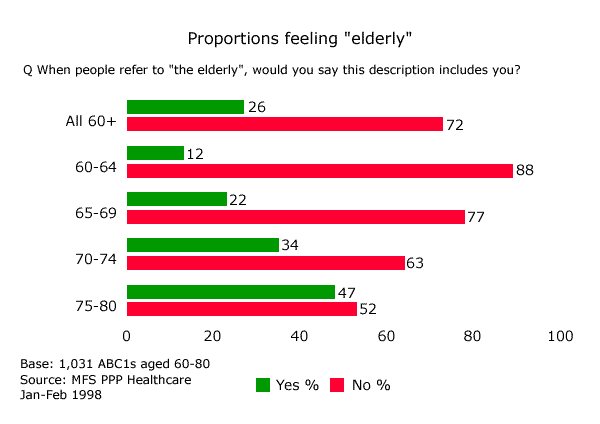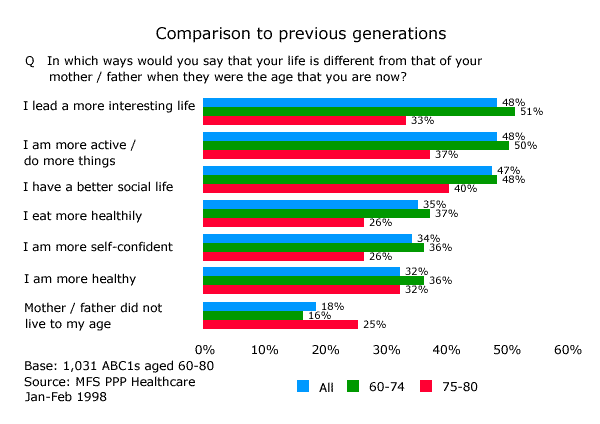Challenges of the Demographic Shift
Foresight Ageing Population Panel Consultation Event 1 Great George Street, London
Society has a preoccupation with youth. Perhaps understandably the young are treasured and nurtured as 'our future', parents put the needs of their children before their own, voters and governments demand education, education, education -- it is the age 'to be' and 'to look'.
But change is afoot. People are living longer and birthrates are declining, so much so that soon -- within the next three/four decades -- older people will outnumber the young for the first time. As has been widely predicted, the numerical superiority of older people may bring social issues such as the resourcing of pensions, housing and healthcare to the top of the agenda. But we shouldn't forget that larger numbers of older people are richer, healthier and more socially active than ever before. As well as having needs to be met, older people also have increasing power and influence to wield.
This paper explores the demographic and economic profile of older people -- highlighting trends and some projections for the future. It looks at their lifestyles, opinion,attitudes and values, given that these may have more social, cultural, and political significance in the future.
The Pace of Change
The pace of change, corporate, product,political and consumer, is accelerating at an accelerating rate. To some people that's frightening all of the time,and to nearly everyone else it's frightening at least some of the time.
Longevity threatens economic stability,global money movement and speed and independence of communications from government restrictions threatens economic sovereignty, the family structure is under threat, with the greatest projected growth the single person household,trends to the service economy and an increasing proportion of women in the workforce, downsizing and growth in part-time jobs, equally desired by both men and women, the rise of the civic society, rejection of role models and loss of confidence in institutions, acceptance of feminism and informality, loss of status and breaking down of hierarchies all present both threats and opportunities to our society.
Empirical data, and especially our work with the Socioconsult consortium of research companies across Europe, has identified a number of 'cross-cultural convergences' too be taken into account:
- A growing gap between institutions and people
- A move from self-centeredness to autonomy
- A flow from ideology to the need for more meaning to life
- A trend from an organised social structure to a network culture
- A current from feminism to feminisation of society
- A drift from rational to polysensorial
All of these will affect our society.
Other convergences include
- Going from saving time to savouring time
- Going from pleasure-seeking to parallel crude and discerning hedonism
- Going from ecology to daily environmental friendliness
But there is a growing sense that daily life has become too stressful, and that security is undermined. In the application of Maslow's 'Hierarchy of Human Needs', sustenance is assured, but security is threatened. Esteem is under attack, and self-actualisation comes hard.
Crude hedonism is on the rise; more drugs,and more anti-social behaviour, and growing faster with young women than young men; too many are what we call the 'underwolves' , which we define as the underdog who bites back .
In the rich world today there are three people in work to support one pensioner; by 2030, this ratio will fall to 1.5 to 1; most of the people in this audience today will be a pensioner. It will take an between 9% and 16% of the GDP in these countries to support today's pension promises, never mind the increased cost of health care and housing that will be required.
Now, pensioners represent one in five of the adult population, but one in four will be a pensioner in two decades. The typical retired household occupant in 20 years will be a lone woman.
All of this will result in resentments building up
- Young against old
- Poor against rich
- Rural against urban
- Scientists against the People
- Producers against consumers
- The People against the Institutions
- Central government against local government
- Everybody against big business
- The globalised (many) against the globalisers (few)
Engineers want high tech; people want high touch.
The media are part of the problem, not part of the solution.
In light of these changing needs and wants, what does it mean when...
- The proportion -- nearly half the workforce -- who fear they are being left behind on IT skills has changed little over the last five years: [1996 -- 46%; 1997 -- 45%; 1998-- 47%; 1999 -- 48%], and among those over 45, 50% this past year. People over 45, and especially those who are 65 and over, are increasingly being left behind.
- While 37% of the British public use a desktop computer regularly at home or work, only 7% of those 65 and over do.
- While 39% of the British public use a mobile telephone, only one in ten OAPs do.
- While 13% of the public have a data modem with connection to the Internet, only 2% of 65 and over do.
- And while 23% of the public use e-mails, only 3% of 65+s do.
Who are the Old?
- Britain's population is ageing at an increasing rate.The proportion of the population of pensionable age rose from 14% in 1951, to 19% in 1991 and is set to reach over a quarter of all adults by 2031. Currently the population is fairly balanced between the under 25s, those aged 25-49 and those aged 50+ (around a third each). The predicted growth of the older population will mean that by the year 2051 the population will be significantly top-heavy: 43% aged 50+, 30% aged 25-49, and just 27% under 25.
- "Young older people" (those aged 55-64,who were once the 'baby boomers'), tend already to be pensioner couples. This group are among the most economically powerful and socially important of any age group, and have high levels of income, savings, expenditure, and political activism.
- "Old older" people (aged 75+), tend to be women and living alone. They are among the most economically and socially vulnerable of all in society. They have the lowest household incomes and levels of expenditure, and the highest instance of poor health and physical immobility.
- There have been changes in the economic status of the young older population, which will have implications for the future prospects of older people. The economic power of the young older population has been based on their continued employment; this level of economic activity has decreased, but their income as a whole has not. This appears to be related to increased access to private pensions and savings, which raises the possibility of pensions allowing the wealth of young older people to be sustained to an older age than currently seen.
- However, this is clearly not the case for a large proportion of older people. Indications are that many young older people are being forced unwillingly out of the labour market. This not only has a negative impact on current income -- it may also have negative implications for future wealth, through reduced pension contributions.
- Declining work activity means that now, more than ever, leisure is key in older peoples' lifestyles. However, the richer and healthier group of young older people seem to enjoy it the most. They are busy with gardening, DIY, activities in the community, and also spend more than any other age group on alcohol and leisure services. They are also more inclined to be positive about being the age they are than old older people.
- Reflecting their lower levels of health, mobility and income, old older people lead less active lives. They spend significant amounts of time watching television and significant proportions of their moderate incomes on more sedate leisure services such as theatre and cinema.
- Older people tend to hold attitudes and values which differ from the population as a whole, and the older they are the more they differ. Given that older people are numerically increasing and they are more politically active than younger people, these differing views will have increasing significance.
- Older people place particular importance on community,spirituality and pleasure, but find risk taking, immediate gratification and pleasure from violence very weak attractions.
- They also tend to support traditional patterns of social and political order -- including class, hierarchy, monarchy and British independence from Europe. As such they have a greater tendency to vote Conservative than the general population.
On the other hand, as I have been preaching,Grey Power is alive and well and living in Britain, as suggests the greatest threat to the continuing in office of this government. Old Age Pensioners were not best pleased with the 75 pence handout from the Labour Government, and the threats of removal of the TV licence concessions and the heating allowance by the Tories. The most recent election in Britain, in 1997, indicated that much of Labour's large majority was accounted for by the attraction to their cause of the over 65s, not only were there nearly twice as many of them as the under 25s, they were more that twice as likely to vote. The Grey Vote represented some 2.5 million votes. In 1997, there was a twenty point Labour lead. Yet in the last quarterly aggregate of voting intentions, combining our monthly polls for the Times in the first quarter of 2000,we found that among the over 55s, Labour had a five point lead, while after the local elections that had flipped to a three point Tory lead, and in the poll on Sunday, taken just after the Women's Institute speech by Tony Blair that went wrong, the Tories were seven points ahead, a 14.5% swing since the general election.
Higher proportions of the over 55s than the nation as a whole are concerned about pensions, naturally enough (+10, at 25%, v. 15%), crime/law &order (+9%, at 43% v. 34%) and Europe (+6, at 25% v. 19%).
I also make the point in Grey Power that the proportion of households headed by someone of pensionable age is over a quarter, and this rises to almost two in five when we include those 55-46. OAPs are 9 million now, but will rise to nearly 15 million by 2031, making up over a quarter of the population.
Declining work -- desired or enforced?
Is the decline in work activity desired or forced upon older people? As may have been expected, there is no single answer which applies to all older people.
Some older people are increasingly able to access reasonable incomes without working, due to the rise in personal and occupational pensions. As we have seen,incomes of older people as a group are growing -- and this pattern of growth has occurred alongside a shift in the sources of older peoples' incomes from wages and self employed earnings to private pensions and annuities. Among households headed by someone aged 65+ income from private pensions and annuities has risen from 13% of total household income in 1980 to 29% in 1996/7, whilst income from wages and self-employed earnings has fallen.
Indications that early retirement maybe a positive choice can also be found in the fact that people over 60 years say that the aspects they most enjoy about being their age are freedom, time to pursue leisure activities, free time and not having to work.
However, research published last year suggests that this rosy view is far from a complete picture, and that the decline in economic activity is so great that it can not solely be attributed to choice. Decline of work activity has negative implications for many people,such as loss of pension contributions. It is likely that for some, early retirement is at best a reluctant choice in constrained circumstances, and at worst an unwelcome end to working life.
A key contributing factor to enforced 'early retirement' is increasing constraints faced by older men on accessing new employment after losing a job. Half who lose their jobs between the age of 45-49 never re-enter the labour market, and it has been suggested that this reflects a shift in labour demand against older men. Factors such as age discrimination, and also the lower prevalence of modern hi-tech skills among older people may be at work.
Older peoples' choices when considering re-entrance into the labour market are also constrained by prospects of a substantial drop in pay from previous earnings.All ages of people tend to face a drop in pay from previous earnings when taking on new work after losing a job, but among older people the drop tends to be far higher than for younger people, and is often 25%-30%.
Some older people also appear to be forcibly driven out of the labour market. For example, there is an apparent tendency for higher earners with occupational pensions to be pushed into early retirement by companies wishing to avoid the expense of the pension contributions. Men in their early 50s in the top quartile of the wage distribution with occupational pensions are 50% more likely to be displaced from their jobs than men of the same age and income with no occupational pension.
Future economic prospects
The trends of increasing access to private pensions and increasing exclusion from the labour market have competing implications for wealth, and raise questions about the future economic prospects of older people.
Given that incomes among the young older population are rising it is clear that currently the positive effects of increasing access to private pensions and annuities are outweighing the effects of exclusion from the labour market. Only time will tell whether this pattern will be sustained among young older people.
And what are the implications for this particular cohort of older people as they become the next old older group? A pattern of economic power in early old age, followed by declining wealth in later years has been apparent for some time. This has largely related to declining economic activity with age, but increasing access to private pensions and annuities could allow increasing numbers of old older people to sustain their wealth to an older age than previously possible. Again, the outcome is far from clear.
Leisure Activities
Older peoples' low level of economic activity means that they have more time to devote to other aspects of life. The main shift in time usage occurring with old age is, predictably, an increase in time available for leisure pursuits. Older people have 32% more 'freetime' available than all adults in general.
What do older people do with their large amount of free time? They tend to participate in more relaxed activities, and this tendency increases with age. By far the most significant of these activities is watching television -- the 65+ age group actually spends around the same number of hours watching television as the average full-time working week.
Attitudes to life and growing old
Older people tend to be more content with their lives than younger people. Two in five are 'very happy' compared to a third among the population as a whole
Proportion of the population who say they are "very happy"
| 160 | % |
|---|---|
| All | 32 |
| 15-24 | 24 |
| 25-34 | 37 |
| 35-44 | 27 |
| 45-54 | 26 |
| 55+ | 40 |
Health is overwhelming felt to be the most important determinant of happiness among the over 55s (73%). A third of older people also find family life and standard of living important, although they are less concerned with family and marriage, and employment and money than others. District of residence is also significantly more important to older people than younger.
Reflecting their contentment, older people are generally positive about being or becoming old. A large majority ABC1s aged 60-80 (the better off and more powerful of older people) feel that the description 'elderly' does not apply to them, although the proportions saying it does increase considerably with age.

Many feel that their life is positively better than their parents at the same lifestage, in terms of leading a more interesting life, being more active a better social life. Among the 75-80 age group things are felt to have improved less, however.

ABC1s aged 60-80 also feel young at heart and believe that growing older does not mean people have to give up the things they enjoy. They are also fairly confident that other people do not stigmatise them because of their age: they disagree that people tend to treat them as having nothing to offer just because they are old, and disagree that people tend to see them as old people, rather than as individuals. Again, old older people are less positive than young older people.
Agreement with statements about growing older
Base: 1000 ABC1s aged 60-80, Jan-Feb 1998
| 160 | All 60-80 | 60-64 | 75-80 |
|---|---|---|---|
| 160 | % | % | % |
| (% agree) | |||
| Feel young at heart | 96 | 96 | 82 |
| Getting older does not mean giving up things you enjoy | 88 | 92 | 81 |
| (% disagree) | |||
| People treat me as having nothing to offer because I am old | 84 | 84 | 86 |
| People tend to see me more as an old person than an individual | 78 | 77 | 81 |
Source: MORI Financial Services (IMFS) / PPP Healthcare
However older people do worry about getting older. Reflecting aspects felt to be important to their lives in general, health and independence (financial or otherwise)top the list of concerns.
There are about the same as the national average in term of how optimistic they feel about the general economic condition of the country over the next 12 months.
Economic Optimism Index
Base: 979 adults aged 18+
| 160 | All | 18-34 | 35-54 | 55-64 | 65+ |
|---|---|---|---|---|---|
| 160 | % | % | % | % | % |
| Improve | 22 | 18 | 22 | 28 | 22 |
| Stay the same | 38 | 35 | 38 | 40 | 35 |
| Get worse | 33 | 32 | 35 | 29 | 32 |
| Don't know | 8 | 16 | 6 | 3 | 11 |
Source: MORI/The Times, May 2000
Values
Socioconsult is an international study using an approach which places peoples' opinions into the context of their social and cultural values. It attempts to draw a link between peoples attitudes and values on the one hand and their lifestyle and behaviour on the other.In a nutshell, it probes beneath the surface of response into the moving forces that account for why we think and act the way we do.
The study reveals substantial differences in values and attitudes by age. For older people, risk taking, immediate gratification and pleasure from violence are very weak attractions. Instead, reflecting their more sedate lifestyles, they are more likely than average to emphasise the importance of pleasure and aesthetic beauty, and to have hedonistic tendencies. Older people also have a very strong attachment to the community and neighbourhood, and a higher tendency than young people to regard religions as important. They are more likely to focus on personal religious experience over organised religion offered by churches,however, and those who do go to church tend to see it as providing an environment for personal experience rather than as a source of comfort.
Expectations from Public Services
Let me conclude with some findings from our recent survey for the Service First Unit in the Cabinet Office from the People's Panel.
Expectations of public services within the 50+ age group vary considerably, but overall, 37% say that public services fall short of their expectations, although fewer, a quarter, of those aged 80+ say this. While more likely to think that public services are ready to listen to complaints, 85% still think that they need a lot of determination to do something about it.
Housing is mentioned as a priority by over a third. They are also critical of the Care in the community project.
They are satisfied in the area in which they live, with 61% saying they are very satisfied. They are, however, very critical about traffic, which affects their quality of life, so they say. They are concerned about facilities for children and young people.
They are less enthusiastic about the benefits of electronic government, have less experience of the new technology, and are less prepared to use new methods of dealing with public services, a third saying they think it will be beneficial, compared to seven in ten 16-24 year olds. A quarter say they would not be prepared to use new technology to access public services and deal with government.
In conclusion
As Lord Sainsbury has said, the Age Shift presents fresh challenges, I believe for the public sector, for the corporate sector, and for the civic sector. He pointed out that 'If British business is to remain competitive, employers will need to make better use of older people in their workforce'. But as I have attempted to show, it is much broader and wider than that. It is a challenge to Government at all levels, to meet the needs of older people and to incorporate them in planning for the future and caring for those who need it in old age. It is a challenge to the City and to business, to not only meet the needs and wants of the older generation, but their values and aspirations as well, and, finally, it is a challenge to the civic sector, to welcome the voluntary support available from the older people as they leave paid employment, take up the slack, and harness the abilities and enthusiasm of older people to ensure they enjoy the most of their golden years.
Thank you.



